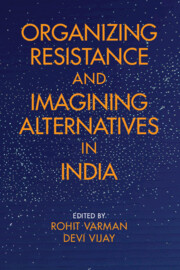Book contents
1 - Capitalist Deathworlds, Alternative Worldmaking
Published online by Cambridge University Press: 30 June 2022
Summary
kaleja phuñk rahā hai aur zabāñ kahne se aarī hai
batā.ūñ kyā tumheñ kyā chiiz ye sarmāya-dārī hai
ye vo āñdhī hai jis kī rau meñ muflis kā nasheman hai
ye vo bijlī hai jis kī zad meñ har dahqāñ kā ḳhirman hai
ye apne haath meñ tahzīb kā fānūs letī hai
magar mazdūr ke tan se lahū tak chuus letī hai
My heart is singed by its flame, capitalism is its name
When it turns into a storm, it uproots many a cobbled tent
As lightening, it destroys the harvest of the peasant
It dazzles the world with its cultural pedigree
But thrives on the workers’ blood, it's free
In this powerful poem titled ‘Sarmayadari’ (Capitalism), progressive poet Asrarul Haq Majaz repeatedly invokes the tropes of ‘monstrosity’ to portray how capitalism sucks the blood of, strangulates, and walks on the bodies of the poor and builds with their bones the chariots of the rich. Capital devours human beings and nature in an endless drive for profits. This insatiable drive for profiteering in recent times has been particularly intensified by finance capital. We live in times when bankers and the financial elite, who are in unprecedented control of the capitalist world, take the monstrosity of capitalism to new levels (Hudson, 2015; Lapavitsas, 2013).
Never in the history of humankind has such a tiny financial elite exercised so much control over the fate of humanity and caused so much mass destruction. Phillips (2018: 31) describes how the transnational capitalist class of bankers and corporate managers speculates on human lives and profits from deathworlds,
Each year, poor nutrition kills 3.1 million children under the age of 5. Twenty five thousand per day, more than 9 million people per year die from starvation and malnutrition. This slaughter is occurring around the world every day…. So while millions suffer, the TCC [transnational capitalist class] financial elites focus on seeking returns on trillions of dollars, which can and does include speculation on the rising cost of food and land. They do this in cooperation with each other in a global capitalist system of TCC power and control that structurally entraps them in cycles of economic growth and contraction, with mass humanitarian consequences.
- Type
- Chapter
- Information
- Publisher: Cambridge University PressPrint publication year: 2022



